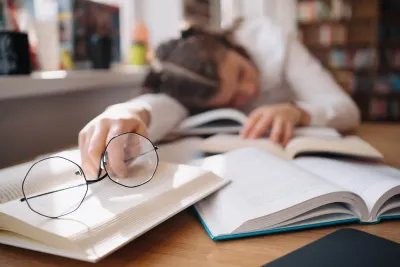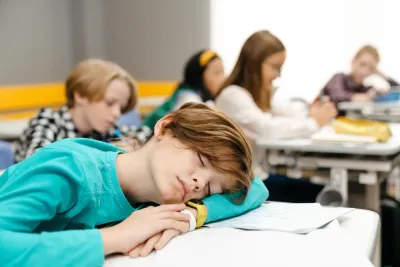
Key Takeaways
Making sleep a priority gives students a real advantage in learning, health, and day-to-day performance.
- Consistent, quality sleep sharpens focus, strengthens memory, and improves problem-solving without relying on all-nighters.
- Good sleep supports emotional balance, reduces stress, and makes social interactions feel easier and more positive.
- Sleep plays a key role in immune health, inflammation control, and physical development—especially for teens and young adults.
- Students who sleep well tend to perform better academically, with stronger attention, memory recall, and test performance.
No one wants to leave a high school football game during the fourth quarter, especially when your team needs only a field goal to win. Your team kicks and scores, but rather than going home to sleep, you celebrate with your classmates into the morning.
Going to bed is the last thing on your mind after your school’s victory, but sometimes “Friday Night Lights” needs to be more like Friday night lights out.
If you’re a parent, advising teenagers and even college kids on the subject of healthy sleep habits and making sleep a priority can be particularly difficult. After all, as far as they are concerned, they are invincible, just like you were at that age following a Friday night game.
How Much Sleep Do High School and College Students Need?
The American Academy of Sleep Medicine recommends that young people aged 13-18 obtain between eight and 10 hours of sleep every 24 hours. [1]
A joint statement of the Academy of Sleep Medicine and the Sleep Research Society recommends that healthy adults between the ages of 18 and 60 get about seven or more hours of sleep every 24 hours. [2]
College-aged students often face unique challenges that impact their sleep, including academic pressures, social activities, and irregular schedules, which can lead to sleep deprivation and affect their daytime sleepiness and learning outcomes.
These same recommendations have been adopted by the Centers for Disease Control and Prevention (CDC). [3]
Students Can Sleep Better Now
Get deeper, more restorative sleep with our cooling mattress pads. Select the right temperature, ranging from 55-115º, to improve your deep sleep and wake up rested.
Understanding Sleep Requirements
Understanding sleep requirements is essential for maintaining good sleep habits. The amount of sleep needed varies across different age groups, with high school students requiring more sleep than college students. The National Sleep Foundation provides guidelines for sleep requirements, emphasizing the importance of adequate sleep for physical and mental health.
College students who prioritize sleep and maintain a regular sleep schedule tend to perform better academically and have better mental health outcomes. On the other hand, insufficient sleep can lead to poor academic performance, increased risk of sleep disorders, and a range of other health problems.
Why is Sleep Important for Students?
During the teen years, the brain essentially goes through what pediatrician Michael Crocetti, M.D. calls a “second developmental stage of cognitive maturation.”(para. 2) [4] Scientists have found a rapid increase in connections between the brain cells during adolescence.
This makes the brain pathways more effective. Major development also occurs in the frontal cortex, the area of the brain that's most responsible for reasoning. [5]
Around puberty, the circadian rhythm, or “biological clock,” begins to change. This is likely due to hormonal changes, which are also responsible for physical changes and dramatic growth spurts. [6] Healthy sleep supports all of these amazing transformations that we see in our young people. [7]
Learn more about the importance of circadian rhythm functioning.
High School Sleep Study: Researchers Find Ways to Help Teens Get More Sleep
The Benefits of Sufficient Sleep
Sufficient sleep has numerous benefits for physical and mental health. It can improve cognitive function, including attention, memory, and decision-making skills. Sleep also plays a critical role in memory consolidation, with research showing that sleep deprivation can impair memory and learning.
Additionally, sufficient sleep can reduce the risk of chronic diseases, such as obesity, diabetes, and cardiovascular disease. The National Sleep Foundation emphasizes the importance of prioritizing sleep and maintaining good sleep habits to promote overall health and well-being.
College Students and Sleep
For college students, the need for sleep decreases to seven hours or more per night. But don’t be fooled. Even though physical growth spurts are over, for the most part, the brain still continues to change. Improved sleep quality is crucial for academic performance and overall well-being, as it enhances mood and reduces depressive symptoms.
Many brain changes occur in the parts of the brain that integrate emotion and cognition. Interestingly, the surrounding environment influences the neural connectivity of structures within the brain. Being sleep deprived can lead to cognitive impairment, decreased memory retention, and lower academic performance, which are significant concerns for college students.
Thus, the new experiences of being in a college dorm, with new people and responsibilities, impact how the brain develops. [8] [9]
Between the ages of 18 and 25, the prefrontal cortex and the associated neural mechanisms become more sophisticated. This results in a progressive ability to be more self-aware and to think more clearly before making decisions. [10]
Sleep Statistic: 50% of college students report daytime sleepiness, and 70% report insufficient or poor sleep.
Too Many Young People are Shorted on Quality Sleep
Students often experience sleep deficits on school nights due to their delayed circadian rhythms and preferences for later bedtimes, and they compensate by sleeping longer on weekends.
Thus, greater than seven out of 10 of our high schoolers were deprived of their sleep needs. [11] As for college undergraduates, some estimates indicate that the majority get between 6 and 6.9 hours per night. [12]

Sleep Deprivation in Students
When kids get to high school, the circadian rhythm changes, resulting in a shift in the timing of the sleep/wake cycle. This makes it difficult to fall asleep before 11:00 pm. [13] With the early high school start times, it becomes near-impossible to get that nightly eight to 10 hours of sleep. [14]
The uncompromising school start times, extensive hormonal and brain changes, and the stress of being a teenager create the potential for a very problematic sleep deprivation calamity. When individuals fail to get sufficient rest, their bodies accumulate sleep debt, leading to adverse effects such as increased depressive symptoms and potential reliance on stimulants to cope with fatigue.
Kids who don’t get enough sleep are at an increased risk for the following:
College students who don’t get enough sleep experience the same detriments as those in high school. Sleep experts have found that sleep problems can affect academic performance in the following ways. To learn more about how to get better sleep as a college student, read our blog: How College Students Can Sleep Better in Their Dorm Room.
- Increased probability of dropping courses
- Cumulative GPA lower by 0.02 points [16]
- Irregular circadian rhythm patterns that are similar to flight traveling of two to three time zones westward [17]]
- Unfortunately, three-quarters of undergraduates surveyed reported that they didn't receive education about sleep health from their university. [18]
College Sleep Statistic: 80% of college students mentioned that lack of sleep negatively affected their academic performance.
Risks Caused by Students Lack of Sleep
- Adverse Health Outcomes Such as Obesity
- Poor Memory Consolidation
- Difficulty Solving Complex Problems
- Elevated Anxiety and Depression
- Type 2 Diabetes
- Decreased School Performance
The Role of Circadian Rhythm
The circadian rhythm plays a critical role in regulating sleep patterns. The circadian rhythm is the internal biological clock that responds to light and darkness to synchronize physiological processes with the 24-hour day-night cycle.
Exposure to bright light in the morning helps regulate the circadian rhythm, while dim light in the evening can disrupt it. College students who have irregular sleep schedules or work night shifts may experience disruptions to their circadian rhythm, leading to sleep disorders and other health problems.
Understanding the role of the circadian rhythm can help individuals prioritize sleep and maintain good sleep habits.
The Importance of Sleep for Academic Success
Sleep is essential for academic success, particularly for college students. Research has shown that students who get enough sleep tend to perform better academically, with higher GPAs and better retention rates.
Sleep deprivation, on the other hand, can lead to poor academic performance, decreased attention, and impaired cognitive function. The American Academy of Sleep Medicine emphasizes the importance of sleep for learning and memory, highlighting the need for college students to prioritize sleep to achieve academic success.
By maintaining good sleep habits and getting enough sleep, college students can improve their academic performance and overall well-being.
How Students Can Optimize Their Sleep
Admittedly, the chronic sleeplessness that our high school and college students are experiencing at the present time is overwhelming. But at Sleepme, we are here to tell you emphatically that there's much you can do as teachers, caregivers, parents, and students to help those you care about get the important sleep they need. Here are just five of the many tips we can offer:
- Maintain the same sleep/wake schedule–even on weekends.
- Create a calming, cooling sleep environment.
- Structure your day and plan ahead to help improve your study skills to avoid last-minute crams and all-nighters.
- Learn about your individual sleep patterns.
- Get some sunshine in the morning (this knocks out the sleep hormone, melatonin).
- Re-evaluate daily schedule to make time for sleep.
Students Should Avoid or Reduce the Following
Students should avoid or reduce the following to enhance their academic performance and well-being.
- Limit rigorous exercise before bedtime.
- Cut back on caffeine consumption after 3 p.m., as it can linger in your body for hours.
- Refrain from eating large meals before bedtime.
- Stop using electronics before bedtime such as TV, video games, computers, etc.
- Abstain from smoking cigarettes; it can inhibit sleep.
- Avoid alcohol consumption before bedtime.
- Limit all-nighters studying for an exam.
Final Thoughts
The rewards of raising the next generation of healthy sleepers are endless, including excellent physical and mental health, chronic disease prevention, and academic excellence.
Although people ages 13 to 24 are challenged by sleep deprivation and other sleep problems, there are several ways to improve overall sleep health.
We all have the capability to spread the word to our schools and universities about the importance of sleep education.
Sleepme is a community of like-minded people facing similar struggles. We offer personalized sleep education resources and helpful tools from hand-picked experts.
Frequently Asked Questions About Sleep for Students
Why Is Sleep So Important for Students?
Sleep is the brain’s reset button. It helps consolidate memory, sharpen focus, regulate emotions, and keep stress in check—basically everything you need to not bomb that midterm.
How Does Sleep Affect Academic Performance?
Students who sleep well tend to perform better on tests, retain more information, and solve problems faster. It’s like upgrading your brain’s operating system—nightly.
What Are Some Quick Tips for Better Sleep in College?
- Stick to a consistent bedtime—even on weekends
- Keep screens out of your bed
- Use blackout curtains or an eye mask
- Avoid caffeine after 2 p.m.
- Try a sleep tracker to optimize your rest
Peer-Reviewed Research References
-
Paruthi, S., et al.
Recommended Amount of Sleep for Pediatric Populations.
Journal of Clinical Sleep Medicine, 2016.
Study Type: Expert Consensus Statement
Key Finding: Children and adolescents require more sleep than adults, with recommended ranges varying by age to support physical growth, brain development, emotional regulation, and learning.
View Study
Source URL: https://doi.org/10.5664/jcsm.5866
-
Watson, N. F., et al.
Recommended Amount of Sleep for a Healthy Adult.
Sleep, 2015.
Study Type: Joint Expert Consensus Statement
Key Finding: Most healthy adults require 7–9 hours of sleep per night for optimal cognitive performance, mental health, and physical well-being.
View Study
Source URL: https://doi.org/10.5665/sleep.4716
-
Centers for Disease Control and Prevention (CDC).
How Much Sleep Do I Need?
CDC, 2017.
Study Type: Government Public Health Guidance
Key Finding: Sleep needs vary across the lifespan, with teens requiring 8–10 hours per night and adults needing at least 7 hours for optimal health.
-
Johns Hopkins Medicine.
Teenagers and Sleep: How Much Sleep Is Enough?
Johns Hopkins, n.d.
Study Type: Academic Medical Education Resource
Key Finding: Biological shifts in circadian rhythm during adolescence delay natural sleep timing, increasing the risk of chronic sleep deprivation in teens.
View Resource
Source URL: https://www.hopkinsmedicine.org/health/wellness-and-prevention/teenagers-and-sleep-how-much-sleep-is-enough
-
American Academy of Child & Adolescent Psychiatry.
Teen Brain: Behavior, Problem Solving, and Decision Making.
AACAP, 2017.
Study Type: Clinical & Developmental Education Resource
Key Finding: The adolescent brain continues developing into early adulthood, particularly in regions responsible for impulse control and decision-making, making adequate sleep essential for healthy maturation.
View Resource
Source URL: https://www.aacap.org/aacap/families_and_youth/facts_for_families/fff-guide/the-teen-brain-behavior-problem-solving-and-decision-making-095.aspx
-
Miller, M. A., & Cappuccio, F.
Why Does the Teenage Brain Need More Sleep?
The Conversation, 2014.
Study Type: Science Communication & Neuroscience Explainer
Key Finding: Puberty-related changes delay melatonin release, shifting teens’ natural sleep window later and increasing vulnerability to sleep debt.
View Resource
Source URL: https://theconversation.com/explainer-why-does-the-teenage-brain-need-more-sleep-29557
-
Bennett, C. M., & Baird, A. A.
Anatomical Changes in the Emerging Adult Brain.
Human Brain Mapping, 2006.
Study Type: Neuroimaging Study
Key Finding: Structural brain development continues into the early twenties, particularly in frontal regions associated with executive function and emotional regulation.
View Study
Source URL: https://www.ncbi.nlm.nih.gov/pmc/articles/PMC6871409/
-
ScienceDaily.
Brain Changes Significantly After Age 18, Says Dartmouth Research.
ScienceDaily, 2006.
Study Type: Academic Research Summary
Key Finding: Significant neurological development continues beyond adolescence, reinforcing the importance of adequate sleep during the transition to adulthood.
View Resource
Source URL: https://www.sciencedaily.com/releases/2006/02/060206105011.htm
-
Veroude, K., et al.
Changes in Neural Mechanisms of Cognitive Control.
Developmental Cognitive Neuroscience, 2013.
Study Type: Developmental Neuroscience Study
Key Finding: Cognitive control networks continue to mature from late adolescence into young adulthood, with sleep playing a critical role in executive functioning and learning.
View Study
Source URL: https://www.sciencedirect.com/science/article/pii/S1878929313000030
-
Hartman, M. E., & Pritchard, J. R.
Calculating the Contribution of Sleep Problems to Undergraduates’ Academic Success.
Sleep Health, 2018.
Study Type: Observational Academic Performance Study
Key Finding: Sleep problems were significantly associated with poorer academic performance, reduced concentration, and lower overall student success.
-
Hartman, M. E., & Pritchard, J. R.
Ibid.
Study Type: Observational Academic Performance Study
Key Finding: Chronic sleep deprivation amplified academic difficulties, particularly during periods of high cognitive demand such as exams.
-
Hartman, M. E., & Pritchard, J. R.
Ibid.
Study Type: Observational Academic Performance Study
Key Finding: Improving sleep duration and consistency may be a modifiable factor for enhancing academic outcomes in college students.









